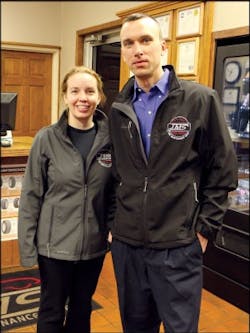The shop was just 600 square feet and had two bays. There were no offices and not much of a waiting area.
And everything that was missing from that original facility—those things that come with grander scale, like capacity and employees and higher revenues—let Andrew Seroogy and his wife, Claire, focus their business on what really mattered: developing a real customer base.
“I think we were able to really understand our customers,” Seroogy, 37, says. “We weren’t making a lot of money, and we knew where they were coming from when they were reluctant to get work done.
“I’m grateful to start from the ground up like that. We have such a respect for our customers because of it. And with designing everything from the floor up like that, we were really able to find who we are as a business, what we wanted to be.”
Now in a five-bay facility down the street, Seroogy’s days are dedicated to keeping his shop in line with the vision he and Claire have for the business. It’s all about providing a genuine, family-oriented experience for both customers and employees.
I can remember sitting in shops as a kid, my parents taking me along when they were getting their cars fixed. It seemed like we’d be there for hours and hours, just waiting, and everyone in there was smoking cigarettes.
I guess one of the things we’ve always focused on was trying to make our shop comfortable for everyone in it—customers, their kids, our employees, everyone.
I didn’t want to be like the shops I was in as a kid, and we never will be.
There’s a bad perception out there with people about our industry and what our shops are really like. We want to change people’s minds. We want them to see what they can, and should, expect from a repair shop.
That’s what we try to do everyday.
We open at 8 a.m., and I’m in here about 7:15. My service advisor comes in then, too, and we get everything ready: Turn on the heat, the lights, get the computers going, get everything set up for the day.
Our shop has come a long way from that 600-square-foot space. We have nice amenities, things that look good to customers. We want customers’ experiences here to be comfortable. We keep it clean. We have nice, peaceful colors on the walls. We have a Keurig coffee machine with some different options and hot chocolate. There are vending machines with pop and snacks, and we probably have the prices lower on those than you’d get if you bought it at Walmart. We’re not trying to make money off the pop machine; it’s there for customers. So why charge more than you need to?
We also have a wood-burning stove that people like to sit around in the winter, and a 53-inch flat-screen TV in a corner and a whole bunch of different magazines.
We want kids to be fine waiting in here, too, so we have this rug we’ll pull out if there are kids in here, where they can play with cars on it and things like that. There are kids’ magazines and some books.
And we keep the bathroom clean. That’s something we get comments on every single day.
The facility used to be a Car-X, and we’re trying to make it into everything we want our shop to be. We moved into it in 2008, and we’re getting there.
I always feel like a good way to tell if your staff enjoys work is to watch them walk in the door. Our team comes in about 30 minutes before they need to, and they’re always chatting and in good moods. That’s a good sign.
Once they’re in here, we will have a sort of informal meeting, just everyone talking about the agenda of the day, if there were any issues the day before, etc. If there’s not much to go over, we’ll just chat about whatever’s on our minds.
Our staff is close. I’m not sure why people say owners can’t be friends with their staff. We are. We go to each other’s parties, family events. Our kids play together.
It is above and beyond crucial to make sure you have the right people in place. For us, that means we do at least three interviews after selecting candidates. And, honestly, one of the first things we look for is people who put the customers, put people, above money. We want them looking at cars as if it were their grandma’s car. I don’t look at people as revenue. They’re a person, not a number, and if you treat their car that way—if you focus on the person behind it—you’re going to do a better job. You’re then looking at making the vehicle safe and not how much we can get out of them.
That’s what our job is: to make sure people leave with safe vehicles.
Obviously, having a great staff allows you to have that great customer service we strive for. I spend the majority of my mornings doing follow-up calls with customers. They’re informal calls, but they act almost like customer surveys for me. I ask how their experience was. Was our staff courteous? How were they on the phone? Was your car clean when you go it? What can we do better next time?
We want to do a great job with every customer, and that information is so helpful going forward.
As owners, our job is to help create that vision of where we’re going, and that’s what Claire and I try to do every day. That’s our main focus, but there are still times when we’re running around helping out. I work closely with our service advisors, and I also help in the shop if we’re overloaded.
I know that’s not what we’re supposed to be doing as owners, but I have that experience in the shop, and if it’s needed, then I’m helping.
We don’t want customers to have to wait three or four hours, or to come in our really busy times and make appointments for a week down the road. That happens to us, and we try to avoid it as much as possible. It’s one of the main reasons we’re looking at adding on three or four new bays in the next couple of years.
I learned early to try to surround myself with successful people. If you do that, you actually have a chance at making it.
I was lucky that I was able to do that early on in starting the business, and I try to keep doing that today.
We don’t do much traditional advertising. Pretty much everything, I would say, is more grassroots marketing, word-of-mouth and referrals. I spend a lot of my afternoons networking with other business owners in the area, successful people that I respect in the way they run their businesses and treat customers.
As strange as it might sound, we get a lot of business out of that. They refer people to us, and we refer people to them. You’re building this community of customers that understand the type of service and level of honesty you can provide.
That’s how we built our business up, and that’s why it continues to grow. We have customers that we’re really, really close with. They’re like family here. We’re invited to their weddings, and even, unfortunately, some funerals.
We’re here to help them out, and I think they understand that and appreciate it.
Pie-thirty—that’s what we call it. Whenever we get any tips from customers or have extra money lying around, we go out and get some pie and ice cream, and we all sit around in the shop and just hang out and eat. Even our customers know about it and join in sometimes.
It’s just one of those little things to show we’re in it together.
We might talk about work, but we often don’t. It’s just a nice way to wind down the day, around 4:30 or 5 or so.
There are a lot of things we’re very proud of with our shop. We’re an ASE Blue Seal shop, and we don’t have any quick lube guys. The guy doing your oil change is going to be an ASE Master Technician. We wanted trustworthy hands on every car that comes in. We’re also an AAA-approved shop, which we feel says a lot about how we’ve built up this facility.
The main thing, though, is our focus on people. I left the dealership world early in my career because I just couldn’t mesh with the ethics of the whole thing. Trying to move people in and out as quickly as possible, 25 techs in the back room fighting over scraps—it’s just not the way this business should be run.
We want to do things the right way, and hopefully, that’s what people will start to expect, more and more, from our industry.
About the Author

Bryce Evans
Bryce Evans is the vice president of content at 10 Missions Media, overseeing an award-winning team that produces FenderBender, Ratchet+Wrench and NOLN.
